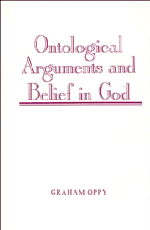Book contents
- Frontmatter
- Contents
- Preface
- Acknowledgments
- Ontological arguments and belief in God
- Introduction
- 1 Some historical considerations
- 2 Definitional arguments
- 3 Conceptual arguments
- 4 Modal arguments
- 5 Meinongian arguments
- 6 Experiential arguments
- 7 “Hegelian” arguments
- 8 Application to historical arguments
- 9 Are there (other) global objections to ontological arguments?
- 10 Is existence a predicate?
- 11 The uses of parody
- 12 Are ontological arguments of any use to theists and/or atheists?
- Conclusion
- Literature notes
- Bibliography
- Index
6 - Experiential arguments
Published online by Cambridge University Press: 05 May 2010
- Frontmatter
- Contents
- Preface
- Acknowledgments
- Ontological arguments and belief in God
- Introduction
- 1 Some historical considerations
- 2 Definitional arguments
- 3 Conceptual arguments
- 4 Modal arguments
- 5 Meinongian arguments
- 6 Experiential arguments
- 7 “Hegelian” arguments
- 8 Application to historical arguments
- 9 Are there (other) global objections to ontological arguments?
- 10 Is existence a predicate?
- 11 The uses of parody
- 12 Are ontological arguments of any use to theists and/or atheists?
- Conclusion
- Literature notes
- Bibliography
- Index
Summary
A simple version of an experiential ontological argument is the following:
The word ‘God’ is not susceptible of an explicit definition but is a term whose meaning can only be had on the basis of religious experience. (Premise)
A body of experience adequate as a basis for an understanding of this term must also be adequate as an evidential basis for assent to the proposition that God exists. (Premise)
(Hence) A denial of God's existence is indicative of a failure to grasp the meaning of the word ‘God’. (From 1,2)
Rescher (1959a) notes that there seem to be words of which it is plausible to claim that their meaning can only be grasped on the basis of experience. In particular, this seems true of words that designate experiences or aspects of experience - words for perceptual contents (colors, odors), words for sensational contents (aches, pains), words for feelings (alacrity, lethargy), and words for emotions (anger, delight). But, given that there are some words of which it is true to say that their meaning can only be grasped on the basis of experience, why should it be thought unreasonable to hold that the meaning of the word ‘God’ can only be had on the basis of religious experience?
There are a number of observations that need to be made.
As things stand, we don't really have here an a priori argument for the existence of God.
- Type
- Chapter
- Information
- Ontological Arguments and Belief in God , pp. 92 - 96Publisher: Cambridge University PressPrint publication year: 1996



